
“An Impartial Overview,” Jawbox’s chosen title for their reunion tour, works only in theory. Perhaps the band themselves can look upon their back catalog with the dry objectivity promised by that lyric from “Chinese Fork Tie,” but for fans of the band, approaching the group’s first proper tour dates since 1997 (a humble, presumably unintended finale on Valentine’s Day in Rochester, NY) with anything close to detachment is an impossible order. The 2009 performance on Late Night with Jimmy Fallon was both blessing and curse: it was wonderful to see Jawbox’s four members on the same stage again, gracing a new audience with the brilliance of “Savory,” but what if that short set was truly the end? For the next decade, I crossed names off the wish list of bands I’d initially missed due to youth or stupidity, but Jawbox remained in all caps. Its members weren’t all hibernating: J. Robbins added to his considerable catalog with Office of Future Plans and his just-issued solo album Un-Becoming while the instrumental Bells≥ pushed Zach Barocas’s considerable chops. There were reasons not to reunite, of course, but if their former single-mates Jawbreaker could do it, why not Jawbox? By the time “An Impartial Overview” was finally announced in January, how could impartiality be expected?

It’s been 23 years since I could conceivably have been impartial about Jawbox. I first knowingly heard the DC band on MTV’s 120 Minutes, presumably with the July 7th, 1996 debut of the human Kerplunk video for “Mirrorful” from their 1996 self-titled album. Their appeal was immediate yet lasting: urgent, melodic guitar rock loaded with lyrical and compositional depth. The reason I taped 120 Minutes was to find music that offered more, that engaged me more, and “Mirrorful” did just that. The distrust of the slanted histories (“Annex and index / Mirror too perfect”) I undoubtedly read that year in social studies resonated strongly, but the combination of J. Robbins and Bill Barbot’s parrying guitar lines, Kim Coletta’s clear and forceful bass, and Zach Barocas’s ingenious fills made me pick up Jawbox on my next CD-shopping excursion. And as was the case with many of the indie/alternative bands I found via 120 Minutes or college radio, the album tracks grabbed me as much, if not more than the lead single. Wrapping my head around the complex rhythms of “Won’t Come Off,” the explosive dynamics of “Desert Sea,” and the lyrical enigmas of “Absenter” kept Jawbox in rotation and prompted purchases of their earlier records, which offered different, but similarly rewarding combinations of immediacy and lasting intrigue.

Jawbox announced their break-up on their web site in 1997, but said site offered a literal gateway to like-minded music. Kim Coletta and Bill Barbot ran DeSoto Records (inheriting it from the members of Edsel), and every order I made with DeSoto brought along a new favorite band: Burning Airlines, Shiner, Juno, The Dismemberment Plan, Beauty Pill, Faraquet, and others. In contrast to many other independent labels, their release schedule was manageable and their hit rate was near-flawless. If they released it, I would buy it and almost certainly love it. None of these bands were carbon copies of Jawbox, which makes sense: if musicians were smart enough to like Jawbox (and in turn, be liked by Jawbox), they were smart enough to do something different and compelling on its own accord. (That statement applies to DeSoto bands, but not all of the bands influenced by Jawbox. The deepest reaches of my CD collection will attest that it was quite possible to sound very much like Jawbox without retaining their creative spirit.) It’s worth noting how much timing factors into my Jawbox-centric worldview: if I’d been five years older and/or had cooler friends, I would’ve learned about Fugazi first, then worked my way through the Dischord catalog and found out about Jawbox that way. Instead, the major label gambits of both Jawbox and Shudder to Think introduced them first and encouraged me to work my way back to Dischord.

Jawbox’s legacy in 2019 resides primarily within the context of intelligent, inventive guitar rock (that doesn’t skimp on melody), which, as ever, does not dominate the zeitgeist. A flash of mainstream influence came when the Deftones covered “Savory,” but Jawbox’s musical DNA lingers on a smaller scale. Many of my favorites from Exploding in Sound Records’ roster, past and present, display some degree of Jawbox genetics: Grass Is Green, Speedy Ortiz, Two Inch Astronaut. Other bands, like the ever-recommended Hammer No More the Fingers, have come into my radar thanks to J. Robbins’ production credits. Availability is the other side of legacy, and fortunately Jawbox’s records have been reissued by DeSoto via Dischord and remain in print. These reissues are not extravagant, vault-emptying collections. True to the Dischord mindset, these carefully remastered pressings exist to maintain a presence, to allow people to hear the records if they so choose. While it would be nice if Jawbox were the beneficiaries of a major critical re-evaluation, the concept of revisiting these records with fresh ears is a conundrum to me: at no point did I stop listening to Jawbox.
Judging by the first two official shows of An Impartial Overview, I am not alone in maintaining my Jawbox fandom for the last twenty years. After a warm-up show in Baltimore, Jawbox came up to Cambridge to play two nights at The Sinclair. It took time for the venue to fill up the first night—I joked about babysitters running late—but by the time Jawbox hit the stage, personal space was at a minimum. The opening acts for the respective shows deserve mention. Friday’s opener was the Philadelphia-based Second Letter, whose lineup includes Burning Airlines drummer Peter Moffett (who also handles the drums for J. Robbins’ Un-Becoming and Bill Barbot’s new band Foxhall Stacks). The five-piece delivered a layered combination of epic guitar rock, power pop, and early ’00s post-emo. My interest waxed when they leaned into the bigger riffs and waned when I recalled bands like The Gloria Record. The opener for the second night was Brooklyn’s LAPêCHE, whose two most recent releases (the 2017 LP The Second Arrow and the 2019 EP Spirit Bunnies) were recorded by J. Robbins. Vocalist/guitarist Krista Holly Diem maintained a careful balance of melancholy and melody over her band’s considered arrangements, and Spirit Bunnies is worthy, quick introduction.

As Jawbox launched into “Mirrorful” to start their Friday set—a fitting rewind to my initial introduction—I was immeasurably pleased that all four members were on stage. I’ve seen enough reunited/reformed bands with substitutes to appreciate a full turnout, and all four members of Jawbox were essential to this equation. I’ve seen J. Robbins play some of these songs acoustically, drawing out their melodic depth, but on these nights he was totally galvanized. Bill Barbot had exited from Burning Airlines by the first time I caught that band, so seeing him on stage helped me gain a new appreciation for and understanding of his role in Jawbox. Not only does he excel as a foil (he absolutely nails the falsetto outro of “Cornflake Girl”) and periodic lead vocalist (“Tongue” and “Breathe”), his heavy chord progressions are critical to songs like “Desert Sea.” I tried picturing any other drummer navigating the minefields Zach Barocas laid out on For Your Own Special Sweetheart and Jawbox and simply could not; in hindsight it makes perfect sense that Jawbox could not continue after his departure in 1997. Kim Coletta was the stand-out of both evenings. I’d never seen a performer beam with such joy, a contagious feeling that was explained by a second-night anecdote about her current day-job of teaching third-graders. In contrast with wrangling a room full of nine-year-olds, playing bass on stage for the first time in over two decades has to feel pretty great.
In the months leading up to these shows, Jawbox posted numerous photos of their basement rehearsals to their Facebook profile, which assured me of the obvious: they did not take this opportunity lightly. They needed to sound like an active band and they pulled it off. I can safely say I saw Jawbox, not a nostalgia-fueled simulacrum of “Jawbox” (an admittedly narrow distinction that’s nevertheless at the heart of why some reunions fall flat). With over twenty songs each night, the set lists highlighted the depth of Jawbox’s catalog, prompting relatively minor grumbles from even the staunchest devotee over exclusions (three such candidates: “Spit Bite,” “U-Trau,” and “Excandescent”). The lone representative from their debut album was “Grip,” which felt like less of a token inclusion and more of a demonstration of how much they could improve that material. Novelty’s finest moments made the cut, including the updated lyrics for “Static.” For Your Own Special Sweetheart and Jawbox (along with essential b-side “68”) correctly comprised the bulk of both evenings, showing how those albums have only improved with age.

Two particular songs stood out. The number of phones raised to record “Savory” confirmed its place as Jawbox’s most beloved song, a sentiment that was upheld by masterful performances both nights. “Tension and release” is the go-to expression, but “Savory” is more tension and relief, the latter represented by the deep exhale of the elongated “Easy now” section. What struck me was how well they underplayed that passage—not only was it quieter with regard to volume, it was gentler in terms of picks hitting strings and sticks hitting drums. Few bands command such restraint, let alone while playing their most cherished song to a rapturous audience twenty-two years after an initial split, and as much as I enjoyed them throwing their bodies into up-tempo tracks like “FF=66” and “Won’t Come Off,” the luxurious lulls in “Savory” stuck with me the most. I couldn’t fathom these sets without “Savory,” and yet shortly after it on both nights, Jawbox pulled a truly unexpected card from their sleeves for the encore: a cover of Drew O’Doherty’s “The Robbery” (here’s my video from night two). J. Robbins had recently relayed his fondness for the song, perhaps tipping Jawbox’s hand, but I doubt O’Doherty—who shared the bill for J. Robbins’ two Boston-area acoustic dates over the last decade—had any expectations of Jawbox playing one of his songs. Merely getting back together was supposed to be the big surprise, not adding a new song to their repertoire, but true to form, Jawbox never settled for simple.
Jawbox’s members were sheepishly grateful for the audience’s ongoing enthusiasm, noting with bewilderment that these shows marked the first time in the group’s existence that they had a multi-night stay at a venue. I suspect that most people in attendance wished that residence could continue longer, both for further opportunities to see the band and to delay the sense that these shows may truly be it. I hesitate to accept such finality, however. Not only will I hold onto the thin shred of hope that Jawbox may re-reunite again down the road, but I know that their records have held up this long, and still offer mysteries to solve and pathways to pursue.
|
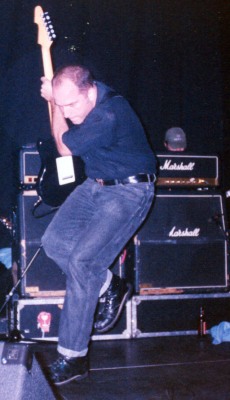
Choosing my favorite albums fronted by J. Robbins* has never been difficult—Jawbox’s For Your Own Special Sweetheart, Burning Airlines’ Mission: Control!, and Jawbox in that order—but choosing ten favorite songs from the D.C. great is a harrowing proposition. Robbins has penned a towering stack of remarkable tracks in the twenty-two years since striking out on his own after the demise of Government Issue. With seven full-lengths, plus a slew of EPs, singles, and compilation appearances to choose from, there are plenty of candidates for this list. Plus, Robbins’ newest group, Office of Future Plans, will release their self-titled debut LP on Dischord in November, likely forcing future revisions.
So why J. Robbins? All of his bands—Jawbox, Burning Airlines, Channels, and now Office of Future Plans—epitomize what I love about D.C. post-hardcore/post-punk: tricky guitar parts, rhythmic complexity, and passionate delivery. But what sets Robbins apart is his voice. In the literal sense, it’s melodic but approachable, strong-willed yet compassionate. I use Robbins’ voice as the barometer for a legion of like-minded late ’90s / early ’00s guitar-rock vocalists**: it never devolves into monotone post-hardcore shouting, never pushes awkwardly out of the ideal singing-along-in-the-car range. In the figurative sense of voice, Robbins’ lyrics rank among my favorites. His songs are opaque, but never outright inscrutable. Even when there’s a clear topic at hand, there are three or four alternate ways to read it. His songs skew both personal and political; each record echoes its era without being trapped by it. His expanded vocabulary prompted a Jawbox Lexicon to appear on the old DeSoto Records site. In short, his intellectual impulses add resonance and depth to the songs, but never turn listeners away.
J. Robbins is the lone common thread across the four bands he’s fronted, but I would be remiss to ignore his universally excellent collaborators. In case you think I’ve ignored the mammoth contributions of Kim Coletta, Adam Wade, Bill Barbot, Zach Barocas, Peter Moffett, Mike Harbin, Janet Morgan, Darren Zentek, Gordon Withers, and Brooks Harlan, don’t worry, they’ll get their due when I discuss individual songs. Sadly, the logistics of choosing Robbins-penned tracks robs this list of the superlative Barbot-fronted Jawbox song, “Tongues.” It similarly precludes the discussion of covers like Joy Division’s “Something Must Break,” Frank Sinatra’s “I’ve Got You Under My Skin,” Big Boys’ “Sound on Sound,” Echo & the Bunnymen’s “Back of Love,” and The Stranglers’ “Everybody Loves You When You’re Dead.” Another list, perhaps.
These ten songs are presented in chronological order to allow for the general narrative. Before you drop an outraged comment that a particular song wasn’t chosen, let me make an obvious point: Choosing just ten songs from these records was nearly impossible. Making a list of Jawbox songs alone would be difficult. I’ve tried to cover as much ground—stylistically and chronologically—as possible, but my preferences for the aforementioned trio of albums and Robbins’ introspective mid-tempo songs were hard to abandon.
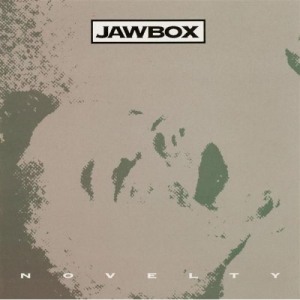
Jawbox, “Dreamless”: There are a handful of worthy songs on Jawbox’s 1991 debut LP, Grippe (“Bullet Park,” “Consolation Prize”), but things got considerably more interesting on its 1992 follow-up Novelty. Bill Barbot joined the group as a second guitarist and vocal foil, which added an essential dynamic to Jawbox’s songs. Managing to be both heavier and more melodic, Novelty represents a quantum leap forward for the group. Although “Static” and “Spit Bite” also merit inclusion, “Dreamless” reigns as my favorite track from this album. It’s a confident merger of the personal and political. Some lines echo Fugazi’s timeless political unrest—“Every minute’s test of our possessions / Leaves us with obsession / That pushes the extreme” (a nod to the Wipers, perhaps?), “Sleep in the nation’s arms is dreamless,” “Clinging to the truth of doctrine so no shots are fired blindly”—but its layered chorus signals something more personal at stake: “Nothing shines in your eyes / Concede my oversight / Blue light burns bright inside / A beautiful disguise.” There’s optimism in Robbins’ portrayal of the system-wearied individual struggling to recognize the potential for reinvention. (Essential note on Novelty: If you don’t already have a copy, make sure you get the remastered version from 2003. The original mix is muddy and unflattering to its source.)
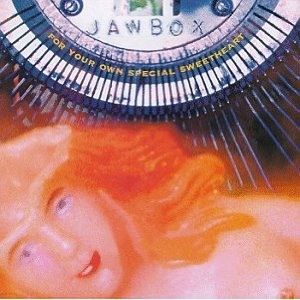
Jawbox, “FF=66”: Jawbox jumped from Dischord to Atlantic for 1994’s For Your Own Special Sweetheart, mirroring the career path of peers Shudder to Think. Like Pony Express Record, FYOSS stands as the biggest achievement in the group’s catalog: a louder, clearer, better statement. FYOSS addresses the major-label jump in its opening salvo. “FF=66” starts with an excerpt of William Carlos Williams reading his 1950 poem: “Seafarers”: “He invites the storm, he / lives by it! instinct / with fears that are not fears / but prickles of ecstasy.” (Full reading here.) I see two primary ways of reading the poem in the context of “FF=66”/FYOSS: first, the “he” is the listener, the invited storm is the music that follows, and the “prickles of ecstasy” are the response to it; second, the “he” is Jawbox, the invited storm is the presumed outcry over leaving Dischord, and the “fears that are not fears” are the ecstatic outlook on this willing future. Either way, it’s an evocative start to the song/album.
Even without its lyrics, “FF=66” would make a huge statement about how Jawbox approached their major-label debut. The razor-wire guitar scrapes, J. Robbins’ barked delivery, Kim Coletta’s swaggering bass line, and new drummer Zach Barocas’s vicious tom work make the aggressive songs on Novelty a quickly forgotten opening act. The melodic chorus slides in seamlessly, betraying zero sense of being shoehorned in by an anxious A&R rep. But those lyrics, specifically “Just want a way not to be what gets sold to me,” present the superior work on FYOSS as way to retain the group’s integrity in the face of that invited storm.
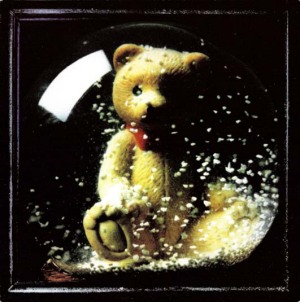
Jawbox, “Savory”: Was there any doubt that “Savory” would make the cut? It’s Jawbox’s most well-known song, having first appeared on a 1993 split single with Edsel, then as the lead single for For Your Own Special Sweetheart, then on Late Night with Conan O’Brien, then as a live cut on the posthumous My Scrapbook of Fatal Accidents compilation, then on Late Night with Jimmy Fallon for the 2009 reunion. Far and the Deftones covered the song. It made an appearance on the inexplicable 1999 K-Tel Nowcore! The Punk Rock Evolution compilation. It made the Pitchfork 500 book and their recent top 200 tracks of the ’90s list. If you’ve heard Jawbox, you’ve heard “Savory.”
What strikes me about “Savory” is how strange it remains, despite potential overexposure. Yes, it’s Jawbox’s most well-known song, yes, it’s arguably their best song, but it’s not a logical, straightforward single. It’s meditative and oblique, filled with droning chords and buried melodies, but its chorus is casually inviting. It offers a cycle of tension and release, but its resolve could merely restart the process. Its lyrics imply divergent topics—the objectification of women, D.C. politics, a manipulative relationship, mutualism—but no reading of the song disavows another. There’s no single stand-out musical performance because they’re all stand-out performances, operating in a closed system of democratic efficiency. Its strangeness is ultimately a sign of its perfection. Few songs gain depth with each successive listen, fewer still retain their initial bewilderment. “Savory” does both.
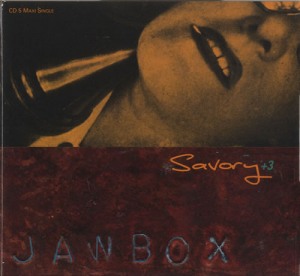
Jawbox, “68”: It’s hard to figure out why “68” was pushed to the Savory EP instead of being included on the otherwise outstanding For Your Own Special Sweetheart. (This injustice was partially rectified when “68” was included as a bonus track on DeSoto/Dischord’s 2009 reissue of the album.) The answer might linger in some fanzine interview from 1994, but since my Jawbox fandom started in 1996, I’ve been at a loss for a specific answer. I have theories, of course—that its melancholic arpeggios would have stood out too much from the distortion of “Motorist” and “LS-MFT,” that its subject matter might have been too personal for wide release, that it didn’t fit into the flow of the album—but none of them justify its banishment to a CD single. In fact, two of those reasons stress why I love “68” so much. Both Robbins’ elongated syllables and those reticent guitars, particularly in the verses, clash with Kim Coletta’s driving bass line, but the song still moves forward with the relentless work ethic evoked in “The paths they’re cut so deep / From thirty years of sleep / Of walking from the quarry to the wall.”
There’s a remarkable lyrical economy to “68,” beginning and ending with “I got the message / Calling me back home.” J. Robbins is too good, too opaque of a lyricist to give a clear-cut picture of what happened, but I’ve always suspected that the song was about a father’s passing. (Jon Mount argues that it’s about Vietnam vets.) The key lines are “And all they try to keep / Is slipping piece by piece / In spite of all attempts at holding on,” which work in so many different contexts, but could easily apply to the family’s support system at home. I listened to the song a number of times and checked the Mission of Burma-inspired alphabetized lyric sheet to make sure that Robbins was saying “they” and not “we” in that line. Regardless of the pronoun or the authorial intent, the lyrics of “68” are simply devastating, just like its musical backing.
On a personal level, “68” now speaks to me like few other songs. I wrote the above two paragraphs sometime in 2009, at which point my father was battling two forms of cancer. He passed away in March of 2010. I can’t hear “I got the message / Calling me back home” without thinking of that phone call. I can’t think of “walking from the quarry to the wall” without thinking of his tireless work ethic, which involved an eighty-minute commute to and from Albany. Jon’s reading of the song as about Vietnam vets reminds me that my father fought in that war and worked to get other vets their proper medical compensation. And I can’t think of “And all they try to keep / Is slipping piece by piece / In spite of all attempts at holding on” without dwelling on how much my father meant to my entire family, and how every member struggles to fill that void. I still recognize that “68” could have been written about something entirely different, but unlike “Savory,” I’ve lost the ability to hear it fresh.
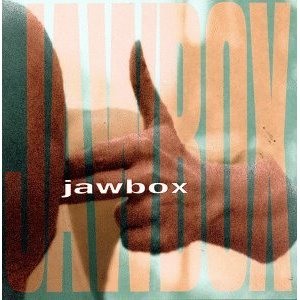
Jawbox, “Absenter”: Jawbox’s self-titled swan-song pulled the group in different directions: more direct (lead single “Mirrorful,” mid-tempo ballad “Iodine”), more rhythm-driven (the Barocas showcases “Won’t Come Off” and “His Only Trade”), more cathartic (“Desert Sea,” “Excandescent”). But its elliptical closer ties these urges together, finding an approachable song amid Barocas’s jazzy snare accents and J. Robbins’ oblique lyrics. Its opening lines—“Entropy’s in / Embroidered on skin / Corrupt, latch-hook thin for show”—have stuck with me as an indirect invitation to a world of J. Robbins’ creation. Based off of its second verse, “Absenter” could have been inspired by yard work or a stray animal, but the end result is a dream-like setting, all evening glimmers and scattered signs. Yet there’s considerable emotion here in “Save a little bit, save it / Send it back to me” and the gang vocals of the repeated title. This balancing act is supported by its cyclical structure, a graceful shifting between gears that could easily continue indefinitely instead of fading out into feedback.
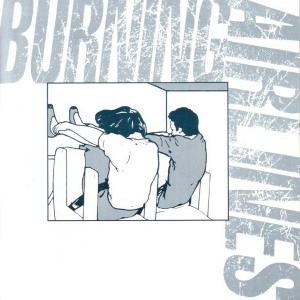
Burning Airlines, “Scissoring”: Burning Airlines’ debut single arrived with considerable anticipation after I mail-ordered it from DeSoto Records in 1998, as it marked one of the first times a favorite group had splintered and then offered a new incarnation. “Carnival” b/w “Scissoring” ended up being the best-case scenario for the post-Jawbox era: two flawless rock songs on one slab of white vinyl that I would play to death until Mission: Control! came out the following year. I could have sworn that the catalog description on DeSoto’s web page read: “One is called ‘Carnival’ and is about a carnival. The other song is called ‘Scissoring’ and is about the French Revolution,” but when I consulted web.archive.org, it says that “Scissoring” is “a post-structuralist reading of the Happy Days episode where Fonzie tries to jump over the barrels on his motorcycle.” I would still like to believe that my memory is accurate and they merely changed the description before that December 1998 crawl.
Those descriptions only reveal the settings of their respective songs. “Carnival” ponders the state of rock music as it transitioned from grunge to alternative to modern rock in the ’90s, while “Scissoring” is a corrupted love song set in the French Revolution. The Mission: Control! version downplays the setting with a subtle shift from “Leave those acolytes on their knees” to “The end of anything so empty,” but I prefer the Reign of Terror overtones of the original take. Stressing the brutal violence of the historical context in that line seems more daring. Both versions have Robbins’ incisive harmonic riff, Bill Barbot’s fluid bass line, and Pete Moffett’s high-hat-heavy bridge, so if you only have the full-length version, you’re just missing those acolytes.

Burning Airlines, “The Escape Engine”: Mission: Control! is J. Robbins’ pop album, hailed with references to his fondness for XTC (along with the band name’s call-back to one of Brian Eno’s weirder pop songs). That comparison isn’t unwarranted—I can hear Drums and Wires and Black Sea in the up-tempo songs—but Mission: Control! doesn’t abandon D.C. post-punk, it just streamlines it. For pure hooks, it’s hard to top “The Escape Engine,” which is accompanied by a brain-burrowing “whee-ooh-wheeee-ooooh” vocal concept from Smart Went Crazy’s Chad Clark. The mammoth chorus of “Make the ending as good as the show / Burn as you go / No connection, no mission control” is ready for repeated drive-time sing-alongs. The irony of these hooks is two-fold: while ostensibly about a space pod plummeting to earth, “The Escape Engine” seems to address the broken relationship between Jawbox and Atlantic, and does so using radio-friendly melodies that A&R reps would drool over.

Burning Airlines, “The Surgeon’s House”: Identikit, Burning Airlines’ second and final LP, offsets its prescient sense of Bush-era and post-9/11 unrest (“The Deluxe War Baby,” “Morricone Dancehall,” “Blind Trial”) with peepholes into J. Robbins’ personal life (mentioning his wife/future Channels bassist Janet Morgan by name in “Tastykake,” the poetic love of “A Song with No Words”). How “The Surgeon’s House” fits into this arrangement is up to a J. Robbins biographer to settle; it could be about the cold relationship between his parents or grandparents, or it could be remarkably inspired fiction about family, memory, and history. Whatever its origins, “The Surgeon’s House” explores novelistic depth in its lyrics and arrangement. Robbins’ careful delivery of “Where did my father find this photograph? / Where is the spite, the narrowed eyes? / She looked so beautiful in black and white” doesn’t reveal the emotional breakthrough, but his guitar work does, turning from empty-hall arpeggios to cathartically crashing chords. There’s no other song quite like “The Surgeon’s House” in J. Robbins’ catalog, but I would welcome another chapter.

Channels, “To the New Mandarins”: Burning Airlines’ Identikit presaged the left’s discontent with the Bush administration, but Channels brought those undercurrents to the surface. I bet Robbins and drummer Darren Zentek’s political outrage was amplified by their gig moonlighting with Vic Bondi’s Report Suspicious Activity, since the direct approach of “To the New Mandarins” and other Channels tracks abandons Robbins’ usual obliqueness. (Regarding RSA, be sure to check out “The Loyal Opposition” from 2008’s Destroy All Evidence, a J. Robbins-fronted track.) I’m of mixed mind on this shift: I typically prefer my political outrage as vague as possible so as not to revisit songs as period pieces, but Channels’ execution makes a strong argument for a change in that policy. It’s a stealthy revelation, one that pushes “Mandarins” past other Channels contenders like “To Mt. Wilson from the Magpie Cage” and “The Licensee.”
“To the New Mandarins” begins with a fearsome foundation of Darren Zentek’s muscular drumming (which recalls his dominant work in Kerosene 454) and J. Robbins seething “Show ’em your Patriot Act!” like a protestor spitting venom on the street. These gut punches are counterbalanced by the song’s melodic touches, especially bassist Janet Morgan’s offset background vocals in the chorus. The specifics of the lyrics may date (“Pranking the homeland hotline / Threat level yellow sunshine”), but its sentiment will come in handy for future administrations.

Office of Future Plans, “Harden Your Heart” I debated not including the first single from J. Robbins’ newest band for one simple reason: it’s the only original song they’ve released to date. But it’s a damn good song that offers plenty of lyrical fodder to discuss where Robbins’ songwriting is twenty years after Novelty.
I hear “Harden Your Heart” as a self-reflective look at J. Robbins’ post-Channels years. “Losing your way / On familiar terrain / Perfecting your mistakes,” “Maybe it isn’t love that keeps you running in place,” “Parading in patterns you swore to break,” “Never let on / Never let in”; virtually every line of “Harden Your Heart” lingers on self-doubt. Is going back to a rock band simply reliving the past? Is Robbins comfortable with exposing his thoughts instead of obscuring them like he did in the past? “Harden Your Heart” asks a big question in its chorus—“Who are you now?”—and answers it with the self-assuring “More than the sum of your doubts.” The chanted title shows how ridiculous the internal opposition sounds when put in context—less an act of oblique poetry, more a stubborn embrace of cowardice.
In order for this self-assurance to ring true, “Harden Your Heart” must be a triumphant reinvigoration of form for Robbins. That’s a more difficult task than you might imagine, since Channels’ two releases were often greeted with “They’re solid, but that’s what we expected” shrugs, even from me. Their execution—the pristine production, the confident, experienced performances, the informed arrangements—would be jaw-dropping from an unknown act, but it was simply more of the same for Robbins. Fortunately, “Harden Your Heart” walks the thin line between mixing things up and playing to its strengths. Robbins and fellow Channels holdover Darren Zentek cede space to the newcomers, with Zentek in particular pulling back from the tom pounding that hammered down Channels songs. Bassist Brooks Harlan lurks in the low-end like Kim Coletta did and adds enthusiastic backing vocals to the chorus. Cellist Gordon Withers finds the best approach for each section, switching between uneasy sawing, stable whole notes, and chugging patterns. The end result recalls the tenor of Channels, the energy of Burning Airlines, and the dynamics of Jawbox without sounding too much like any of them. It is a triumphant reinvigoration of form, one that has me foaming at the mouth for their upcoming LP.
|
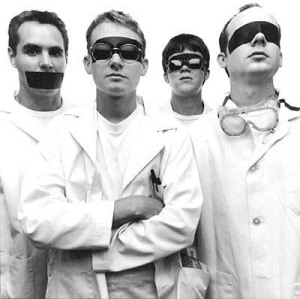
Champaign, Illinois’s Hum has reigned as one of my favorite bands for more than half my lifetime, but when I listen to their records, it’s easy to understand such devotion. Heavy but not plodding, spacey but always grounded, intelligent but still approachable, Hum’s trio of Electra 2000, You’d Prefer an Astronaut, and Downward Is Heavenward made the world of ’90s alternative rock a considerably more interesting place. While they’ve been essentially inactive since 1999, you can count on a reunion show every few years to satiate their legion of die-hard fans.
The only surprise about the release of Songs of Farewell and Departure: A Tribute to Hum is that it took this long to happen, given the number of Orange amplifiers the group helped sell. Pop Up Records issued The Nurse Who Loved Me: A Tribute to Failure back in 2008, and the cross-over in fan bases and influence is significant. Perhaps the lack of a big name like Paramore, who covered “Stuck on You” for the Failure tribute, delayed the release of its Hum-honoring counterpart, but Songs of Farewell and Departure did net a few groups (Junius, Constants, Actors & Actresses) that I’ve long suspected of pulling influence from Hum and a completely unexpected guest appearance from Jawbox / Burning Airlines frontman J. Robbins.
The big name that presumably escaped Pop Up’s grasp is the Deftones. Vocalist Chino Moreno has expressed his fondness for You’d Prefer an Astronaut and it’s easy to hear echoes of Hum’s heavy-yet-spacious guitar tones in countless Deftones songs. (I remember wondering if White Pony bonus track “The Boy’s Republic” was an overt nod to Hum b-side “Boy with Stick.”) The Deftones may be absent from Songs of Farewell and Departure, but their presence is still felt in the metallic approach taken by some of the groups. In a recent run-through of eighteen covers of the Smiths’ “Please Please Please Let Me Get What I Want,” which included one from the Deftones, New Artillery collaborator/BFF Jon Mount said, “The Deftones are a litmus test for people who liked Hum for all of the wrong reasons.” While I disagreed with the sentiment to a certain extent, there’s a nugget of truth there. Hum’s endearingly nerdy tendencies—Matt Talbott’s scientifically inspired lyrics and thin singing voice (that cracked awkwardly throughout Electra 2000)—are not the source of their prevailing influence. Instead, those heavy-yet-spacious guitar tones are often picked up by groups already heavier and/or more aggressive than Hum in the first place, like the Deftones.
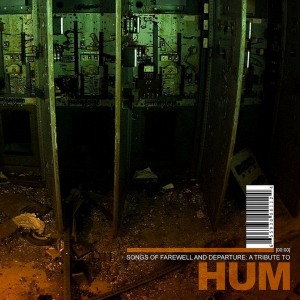
To help me sift through the sixteen covers on Songs of Farewell and Departure, I’ve recruited a peer from the Hum Mailing List days, Dusty Altena, who you may know from his blog, Tumblr, or Twitter.
SS: How many of these bands had you heard prior to this compilation?
DA: The only band I’ve heard of is Junius and J. Robbins (full disclosure: I am apparently not familiar enough with Jawbox to know Robbins by name). I love Failure too, but I had no idea who Kellii Scott was [the drummer on Fantastic Planet]. Sorry Kellii!
Is there a band you wish had made an appearance?
SS: It honestly would have been nice to hear the Deftones take on one of these songs. I suspect that Jesu's Justin Broadrick doesn't pull much influence from Hum records, but the thought of hearing a slow-motion rendition of "Isle of the Cheetah" from him is exciting. In a general sense, I wouldn't have minded hearing a post-rock band like Caspian take on one of these songs. The Life and Times could have done a good version of a song as well—they’d appeared on the Jawbox tribute record, so they’re a reasonable possibility. Bob Nanna of Braid / Hey Mercedes did a string of covers for his blog, so unless he hates Hum, I’m betting you could convince him to essay “Dreamboat.”
DA: I am an unapologetic Deftones fan, so I love your Deftones suggestion. I’d also love to hear some contemporaries like Jeremy Enigk, or maybe even Man…or Astroman. A Jesu post-rock cover is a great idea as well. I can’t think of any folk or semi-folk singers who’ve professed a fondness for Hum, but can you imagine a Jose Gonzalez-like cover? I would love to hear that.
SS: Let's get down to the bands that did appear on Songs of Farewell and Departure.
1. Arctic Sleep's “The Scientists”
SS: This is an entirely competent, if not hugely inspired beginning to the compilation. It's a very, very faithful take on the original, barring a few minor embellishments: heavier bridge, bigger drum sound, acoustic outro. It would have been great if they did something different with the song, though.
DA: I think competent is a perfect description for this track, ‘The Scientists’ is my favorite song on Downward Is Heavenward; but do I really want to listen to that same song with slightly different vocals? Not really. I’ll give you competent, maybe even good; but not inspired. I will admit that I dug the heavy drums and even the acoustic outro. But I was hoping for a much more original take.
2. (Damn) This Desert Air's "The Pod"
DA: I was really into the beginning of this one; it reminded me of Short Bus-era Filter. But by the time the chorus starts, it’s back to the same trap that most tribute albums fall into: faithful, faithful covers. At this point I just want to listen to the original, because it’s the same, and also better. The outro brings back that Short Bus palm-muting, and I have to admit I would love to hear the whole song reimagined on those terms.
SS: This one reminded me of a Failure / Quicksand hybrid. There’s potential here for a much more aggressive and ominous rendition if they’d ran with that palm-muting, but it follows the plot too closely.
3. Solar Powered Sun Destroyer's "Stars"
SS: If you had told me in 1997 that I'd one day hear J. Robbins sing on a cover version of "Stars," my head would have exploded. It's not that Jawbox and Hum were mutually exclusive elements in my record collection—Shiner is the explicit midway point between the two groups—but it's not a crossover I ever expected. Beyond Robbins' vocal take (which I like), Solar Powered Sun Destroyer's version adds depth but no major wrinkles.
DA: This is obviously intended to be the highlight of the album for most listeners. “Stars” remains that one Hum song that everyone remembers (even Beavis & Butthead). I still remember the night I was laying in bed and first heard this on the radio. It honestly changed music for me. I really like the post-rock intro on this version, but I don’t love the sharp enunciation, and I am not sure how I feel about the reimagined harmonies (seriously, I can barely recognize J. Robbins). This version is pretty damn close to the original, but you can hardly blame them—this song is crazy fun to play.
4. Bearhead's "Ms. Lazarus"
DA: We finally get to the first radical departure from the original. “Ms. Lazarus” was never one of my favorite Hum songs, but it had its place. This, I don’t even know what this is. I applaud the effort to make it different, but I cannot stand this alternative emo bullshit—these are basically 2006 Panic! at the Disco vocals—and I don’t want them anywhere near my Hum memories.
SS: It took me a second to figure out which song they were covering. The vocals are a non-starter for me (especially the “Shines I only wish that it was mine!” emo-thusiasm), but there are a few good rearrangements of the original guitar parts.
5. Anakin's "I'd Like Your Hair Long"
SS: Here are the nerdy vocals! Between the band's name and the vocalist not sounding like a dude chugging Muscle Milk, Anakin is in my good graces. It's not a drastically different version, but slowing down the song's main riff and adding cooed background vocals in the chorus are good calls.
DA: I like the slowdown, but the Ben Gibbard vocals annoy me. The further I trudge through this tribute, the more I am realizing how perfect Matt Talbott was as Hum’s frontman. Still, despite the Gibbardish singing, this is one of the more listenable songs so far. I will agree with you that the background cooing was a nice touch.
DA: Since Junius is the only band featured on this tribute who I am really familiar with and "Firehead" is one of my all-time favorite Hum songs; I was more excited to hear this track than anything else on the album. It passes the originality litmus test (one of maybe four other songs on this record)…but is it actually good? I would argue yes. It sounds almost nothing like the original—Hum’s intense subtlety is harder to grab than you would think—but it captures enough of the original while adding just enough unfamiliarity to make it interesting. It is definitely my favorite on the album so far.
SS: Co-sign on the success of Junius’s version. The big guitar/synth sound on the bridges is vastly different from the tone of the original, but fits the material perfectly. Even the vocal delivery, something that bothered me on The Martyrdom of a Catastrophist, fits well.
7. Constants' "If You Are to Bloom"
SS: This is a largely predictable applicable of Constants' space-metal aesthetic to "If You Are to Bloom." I wish they'd done an extended jam on it or something.
DA: Way too faithful for me. Once again, I immediately want to open iTunes to listen to the original. This is the exact same song with slightly different (and worse) vocals—the very same reason I generally avoid outtakes and demos. I feel like this song adds nothing unless you are a die-hard Constants fan whose dying wish is to hear them play a Hum song. My only praise is that the production reminds me of Keith Cleversley (YPAA’s producer), and I always wanted to hear what Downward Is Heavenward would sound like if it was produced by him.
SS: Wasn’t there a rumored first take on Downward helmed by Cleversley? I remember hearing that rumor at some point.
DA: I don’t remember ever hearing that, but I wouldn’t be surprised. Hearing a Cleversley-produced take on Downward will always be one of my Cancer Wishes.
SS: Have you seen Cleversley's site? Apparently he gave up producing a few years ago to get into shamanism.
DA: Ha! I hadn’t heard that, but that is amazing. I guess there isn’t much less to prove after perfectly producing one of the greatest records ever.
8. City of Ships' "I Hate It Too"
DA: Another faithful cover. At this point I would kill to hear Cat Power’s take on one of these tracks. Is the problem that it’s impossible to get at the essence of Hum without sounding like…Hum? The vocals are good, and so are the guitars; but, this honestly just sounds like an unreleased demo. It’s one of the better tracks so far, but that’s just because it sounds the closest to the original. So, what’s the point?
SS: This is absolute par. How many bands do you think took Hum’s gear list as a starting point for their musical careers and saved up for Orange amps? Do you think sounding exactly like Hum on a tonal level is the end goal for these bands?
DA: Judging by all of the @replies I get whenever I mention I own both pressings of You’d Prefer An Astronaut on vinyl, I would imagine that number is huge—I can’t think of any other band that has such a ridiculous cult following. I certainly remember buying MXR Phasers and salivating over Orange amps back in the day. I think a big part of playing Hum songs is trying to get that heavy-as-hell space sound that the band perfected.
9. Actors & Actresses' "Aphids"
SS: I can't tell of Actors & Actresses' version of "Aphids" is that much better than the covers which preceded it, or if picking a song I haven't heard eight million times is an enormous help. It's an interesting instrumental mix with softly delivered vocals that amplify, rather than disregard, the original vocal melody. Worth going back to a few times.
DA: "Aphids" has always been one of my least favorite Hum songs, but oddly, this is one of my favorite covers on the album. It feels like Actors & Actresses are taking a Hum song and making it their own rather than the other way around, and I truly appreciate that. I feel like these guys have come the closest to reaching that thin (and coveted) coverer/coveree relationship thus far.
10. Digicide's "Comin' Home"
DA: And we’re back to pseudo-Hum songs. In fairness, I don’t know how you’d cover this song and maintain the Hum elements while making it your own; but come on—this is basically the exact same backing track with slightly different (more emo) vocals. I honestly think (nu-metal band) Dope could record a better cover of this song. 10 times out of 10 I would rather listen to the original than this.
SS: Pseudo-Hum is right. Aside from some double-kick drum and the nu-metal scream of “And we wouldn’t know!” it’s a too-faithful take on “Comin’ Home.” Yawn. Speaking of takes on “Comin’ Home,” do you remember the original live version that was floating around before Downward came out? I always thought the chorus was “I’ll treat you like a son,” which killed me, but the It's Gonna Be a Midget X-Mas version is “I’ll treat you like a sound,” which I also like.
DA: Yes! I loved that version of “Comin’ Home”, and I think I might even still have an .mp3 of it somewhere. I listened to it enough to be bummed when such a different version appeared on Downward. That original was so powerful! There was an early bootleg of “Dreamboat” that was just awesome, too. Speaking of misheard lyrics; I always thought the end of the chorus on “The Pod” was “Wait, wait on me, yeah”, but on [Damn] This Desert Air’s version, it’s “Way, way on the end” (and what sounds like “Way, way on the edge” the second time). That puts the mood of the song in a totally different context for me.
11. The Esoteric's "Iron Clad Lou"
SS: I knew this was coming. The monotone post-hardcore/nu-metal bellow points its finger right in my face. The rigid arrangement opens up a bit on the bridge with dueling solos, but it all sounds like an exercise. No, you do not win.
DA: I actually appreciated this one. I loved the attempt to make it their own. Do I think it worked? No. But I will take this a thousand times over the “Comin’ Homes” and “If You are to Blooms” on this tribute. I appreciate the effort. Maybe it would work better with a band like Glassjaw, or something else along those lines. The Esoterics have me interested in the possibilities, which is more than most of these covers.
SS: I like the idea of a Hum tribute band named The Comin’ Homes.
12. Tent's "Little Dipper"
DA: I don’t even know what to say about this one. "Little Dipper" is arguably my favorite Hum song ever, but is this even a cover? The only recognizable element is the lyrics (which are barely audible in the original). I give them props for the crazy originality, but I feel like this is more in the realm of appropriation than cover. It’s not awful musically, but I feel like it’s a fork in the road pointing to A) Hum or B) Clouddead. Not exactly a cohesive take one of Hum’s more transcendent songs. Even after more than one listen, the music has absolutely no similarity to the original for me. I love Failure, but I’m not giving Kellii Scott a pass on this one.
SS: It’s a cover of “Little Dipper,” a song that thrives on its waves of guitar riffs, done with no prominent guitar parts. Instead, they’re replaced by up-front drums, piano, strings, and spoken word vocals that turn the sci-fi romance of the original version into weird threats. There’s heavy breathing, for fuck’s sake. You’re right that there’s no similarity to the original on a musical level, but I’ve heard covers that take that route and still succeed (Joel R. L. Phelps & the Downer Trio’s “The Guns of Brixton” comes to mind). What bothers me most here is the abandonment of the original sentiment.
13. Stomacher's "Why I Like the Robins"
SS: If you'd told me that one of these covers would be undone by an irritating vocal affect, I would have presumed it was Junius, but Stomacher sabotages an otherwise acceptable version of "Why I Like the Robins" with its overly manicured delivery. Most of it is par for the course, but they add some nice guitar textures to the outro.
DA: I never loved this song in the first place (except the song title, which weirdly has always been one of my favorites), but once again I am annoyed by the proximity (close, but worse) to the original. I can’t say I am actually irritated by the vocal effects as much as you are, but this song is more boring than the original and adds nothing new, save for a nice effects-laden outro.
14. The Felix Culpa's "Puppets"
DA: “Puppets” is one of my favorite Hum songs, but mostly because it’s recorded with an excitement by the band that isn’t found on any other release (perhaps due to the members switching instruments on the recording). This cover basically takes all of that excitement away, which is unfortunate. It isn’t horrible to listen to, but I feel like it’s lost its essence.
SS: This was when my “I really just want to listen to the original version” impulse kicked in. It’s a faded carbon copy. “Puppets” is a great song, but I don’t know how much any group could have done with it. Once you lose the forward momentum of the original, it falls flat.
15. Funeral for a Friend's "Green to Me"
SS: These Welsh post-hardcore/emo guys try their damnedest to turn "Green to Me" into a power ballad, but pulling out the heavy guitars, adding IDM-for-beginners beats, and going super MOR on the vocals just makes the song boring, if not elevator-ready.
DA: The intro was nice for all of about 25 seconds. Once again, someone emphasizes just how bad Hum would suck without Matt Talbott as the frontman. Even Guns’N’Roses could have made a better power ballad out of this song. (Although I wouldn’t be surprised to hear this on next week’s episode of Teen Mom.) This is probably the worst song on the album, despite the band’s effort to make it original (which I am usually on board with). My god, I just want to turn it off.
16. Alpha Stasis's "Scraper"
DA: I always hated "Scraper" back in the day because it was so hardcore, but I have recently come to appreciate it a lot more. This song does an okay job of capturing that energy, but as with the rest of the album, it is too similar to the original. The Electra 2000 version is better, and it’s actually Hum, so what’s the point of listening to this? There is absolutely nothing new brought to the song. Isn’t this why you start a band in high school—to cover your favorite songs and get them to sound exactly the same? I feel like this would have been an amazing song for J. Robbins to appear on. Can you imagine Scraper sounding like "Savory"? We can wish.
SS: Now you’re making me imagine how great an Electra 2000 covers record fronted by Jawbox-era J. Robbins would be. Thanks a lot.
I’m tempted to just criticize the original, which is one of the weaker links on Electra 2000. Its two-chord trade-off plods, Talbott’s delivery is trying, and the lyrics are painfully confessional without the filter of some science-fiction narrative. The best part is the spoken word bridge: “Say hi to your folks / be nice to your lunchmeat,” etc. Aside from tossing out that bridge, Alpha Stasis mostly gives “Scraper” a modern production update, at least until the nu-metal “Yours make me cry!” scream. I got a laugh out of that one.
SS: Wrapping up, are there any songs you’d wished a band had tackled?
DA: I would have loved to hear the namesake of the album, “Songs of Farewell and Departure” (always one of my favorite Hum songs). “Winder” would have been great. I also would have loved to hear a new take on “Shovel.”
SS: “Songs of Farewell and Departure” would have been a good pick. I would have liked to hear versions of "Afternoon with the Axolotls," "Winder," and "Isle of the Cheetah." Those all seem like songs that could be taken in vastly different directions and still hold up. Do you think a band could have done something different with “Diffuse”? Would you want to hear an aggro rendition of “The Very Old Man”?
DA: That’s a good question. I originally put “Diffuse” in my list of songs I would have wished for, but I took it off when I realized it probably would have just ended up another pseudo-Hum song. I think it would have ended up being treated the same as “I Hate It Too” or “The Pod”. “The Very Old Man” would be awesome, though. It’s always been my absolute least favorite Hum song, but I would love to see what someone (think Chad VanGaalen) could do with it.
SS: The moral of Songs of Farewell and Departure (and the vast majority of tribute records, to be fair) is that more of the bands needed to try different things with the material and actually pull off the concepts, not just aim for and easily achieve pseudo-Hum status. The hypothetical covers we've come up with interest me a lot more than the majority of songs here, although Actors & Actresses, Junius, Solar Powered Sun Destroyer, and Anakin deserve credit for their contributions.
|
Various Artists – Screw 7” – Simple Machines, 1991 – $1 (Cheap Thrills, Montreal, 10/10)
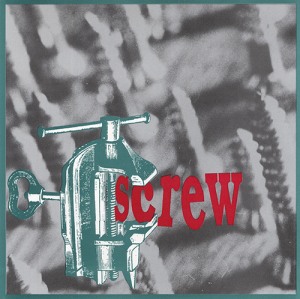
I recently discussed subscription series singles as a prime temptation of 1990s independent music, but limited edition runs like Simple Machines’ Machines series also did the trick, bringing promising DC-area groups like Jawbox, Lungfish, Edsel, Nation of Ulysses, Autoclave, Tsunami, Velocity Girl, and Unrest together with a few national acts like my beloved Rodan (representing with the dominating “Darjeeling”) and Superchunk. I can’t say whether they were immediately successful—hello, I was ten at the time—but I certainly ran into high prices for certain volumes well after Simple Machines issued a compilation CD. The label followed it up with Working Holiday in 1993, a monthly series that included both familiar names like Superchunk, Jawbox, and Lungfish and new artists like Crain, the Grifters, Pitchblende, Swirlies, Versus, and Codeine. Equally hard to track down, these singles were compiled in 1994 and initially accompanied by a much sought-after live disc from their January, 1994, Working Holiday live weekend. Jason Noble from Rodan/Rachel’s MC’d the event and many of the aforementioned bands (plus Archers of Loaf!) are represented on the live disc. (I would be tempted to book a trip there if I ever gain access to a time machine.) Rodan’s contribution, “Big Things Little Things,” never got a proper studio release. Given the trouble I had tracking it down myself (trading Hum bootlegs for a cassette dub in the late 1990s) and its resolute out-of-print status, this link seems appropriate:
Download Working Holiday! Live
Back to the single at hand, however. Screw was the fourth volume of the Machines series, featuring four DC/Baltimore-area groups: the post-punk Candy Machine, the hardcore leanings of a nascent Jawbox, and the female-fronted rock of Geek and Velocity Girl. It’s safe to say that all of these bands (or members of the bands in the case of Geek) went onto do better work, but this single is an interesting time capsule in how you could easily have seen these bands share a bill back then.
Lead-off band Candy Machine doesn’t get discussed much nowadays, but I still bring out their 1996 DeSoto Records LP Tune International from time to time. Every time I go back something interesting pops up. The spoken word shuffle of “6 Months of Light” recall contemporaries June of 44’s Engine Takes to Water—as does the song’s reference to Henry Miller—and there are a few signs of aesthetic cross-pollination with Baltimore compatriots Lungfish, but there’s also Kraut-rock in the rhythms, the Fall in the delivery, Gang of Four in the strut, all of which are profoundly good things. As for Candy Machine’s contribution here, “My Old Man”—their first officially released song, if Discogs is accurate—I mostly hear a more melodic companion to Lungfish’s early records. Again, a good thing!
I previously expressed my disinterest in revisiting Jawbox’s earliest recordings, but I’ll make an exception for “Footbinder.” A noisy rocker with distorted vocals from their three-piece days (J. Robbins, Kim Coletta, and Adam Wade), “Footbinder” doesn’t represent what I love so dearly about Novelty, For Your Own Special Sweetheart, and Jawbox, but what it lacks in melody and clarity it makes up for in sheer propulsion. It’s certainly a lot easier to think of J. Robbins coming from DC hardcore with this song than the polished recordings to follow.
Geek was one of Jenny Toomey’s first bands before she joined up with housemate and Simple Machines co-proprietor Kristin Thomson for the considerably more prolific Tsunami. Geek’s catalog is limited to appearances on a few singles/compilations and a very limited cassette on Simple Machines which collected sixteen tracks. (It’s a testament to Toomey’s business acumen that she knew not to press a stack of LPs or CDs for a band that only had one tour, even though it was her band, but I’m a bit surprised this material was never reissued after Tsunami became more popular.) Geek had already appeared on the first Machines single, Wedge, alongside Lungfish, Edsel, and The Hated. Their Screw contribution, “Hemingway Shotgun,” teases a bit with an occasional dose of a tricky harmonic riff (reminiscent of Rodan and Crain), but mostly sticks with straight-ahead rock. Perhaps I missed out by overlooking Tsunami all of these years.
Velocity Girl was also in its infancy for “What You Say.” They’d switched from Bridget Cross to Sarah Shannon on vocals but still a few years off from their 1993 debut LP Copacetic. There are hints of the shoegaze tag they’d earn with that LP—specifically a tremoloed chord during the chorus that recalls My Bloody Valentine’s Isn’t Anything—but the general sound is more of melodic indie rock with friendly female vocals. It’s the most polished song here, so it’s hardly a surprise they moved up to Sub Pop.
Unless you stumble across one of these singles in the cheap bin, I highly advocate checking out the The Machines compilation, which still appears to be available through Amazon. Same goes with the Working Holiday compilation, which is still available from Dischord. These discs are time capsules of a particular era of American indie rock, but they’re worth digging up if you’re at all inclined.
|

Back in 2007, cellist Gordon Withers recorded an album of Jawbox covers, showcasing the compositional strength of the group’s literate D.C. post-punk/hardcore. As someone who played the cello growing up (and occasionally since then), Withers’ talent and ingenuity made me green with envy. He captured their melodic grace, their stabs of dissonance, and their emotional core, taking interesting and unexpected approaches to translating J Robbins’ vocals, Robbins and Bill Barbot’s parrying guitars, and Kim Coletta’s rolling bass lines. It’s the sort of project that usually sounds more interesting on paper than in actuality, but Withers managed to make it compelling.
If the achievement alone wasn’t enough, all proceeds from Jawbox on Cello: A Benefit for Cal Robbins went to J’s son, Callum Robbins, who suffers from Spinal Muscular Atrophy. Withers wasn’t alone in his charity—there was a great 2CD compilation, bands like the Dismemberment Plan, Snapcase, and Arcwelder reunited for shows, and hey, you can donate directly as well—but his album was such a unique, personal tribute.
All of this lead-in brings me to his new album, which is now available for pre-order. But it’s no normal pre-order. The album has been recorded—by J. Robbins, of course—but the mastering and physical pressings still await funding. This is where you come in. If Withers gets $2,500 by October 14th, the album will happen. The range of donations is tantalizing— for starters, a buck gets your name’s in the liner notes, a fiver gets you the mp3s, eight bucks gets you the CD, ten gets you the vinyl and two bonus tracks. Past that, things get progressively more interesting. For $50 you can get the vinyl and either a custom piece of artwork from Dave Gonzalez or a cello-ized song of your choice. (Rodan’s “Darjeeling” is awfully tempting.) $100 gets you both. For $500, you get everything plus a solo performance from Withers in your house for you and your friends and even a cello lesson if you want. It’s an impressive array of options.
Withers is currently halfway there, leaving over $1200 to go. Not to sound like a broken record about supporting music, but this pre-order is a perfect opportunity to put your money where your mouth is. I’d love this sort of funding to become commonplace, so help Withers set a great, encouraging example.
|
|
This clip was featured on VH1’s Best Week Ever, but they didn’t credit the band: Kevin Federline sings a Pilot to Gunner song on One Tree Hill. I would say that the J. Robbins protégés deserved a healthy cut of money for the (mis)use of their song, but perhaps it’s a source of bragging rights in Brooklyn.
There has already been a 2CD benefit compilation for J. Robbins’ son Callum (featuring exclusive songs from Channels, The Life and Times, Mission of Burma, and Pilot to Gunner’s excellent “All the Lights”), but the second benefit release to surface is an entirely different beast. Gordon Withers has recorded an entire album of cello-only Jawbox covers. If you had told me ten years ago that someone had recorded an entire album of cello-only Jawbox covers, I would put good money on it being me, but thankfully Withers is a far superior cellist as his performance on “Desert Sea” attests.
I should probably just do a large YouTube post, but here are some of my recent favorites: Shudder to Think performing “Hit Liquor” and “X-French Tee Shirt” back in 1993, Girls Against Boys performing “Bulletproof Cupid” in 1993, Shannon Wright performing "Louise" in 2007, a batty video for Colin Newman's "B", and a fruity video for Wire's Eardrum Buzz.
|
|

